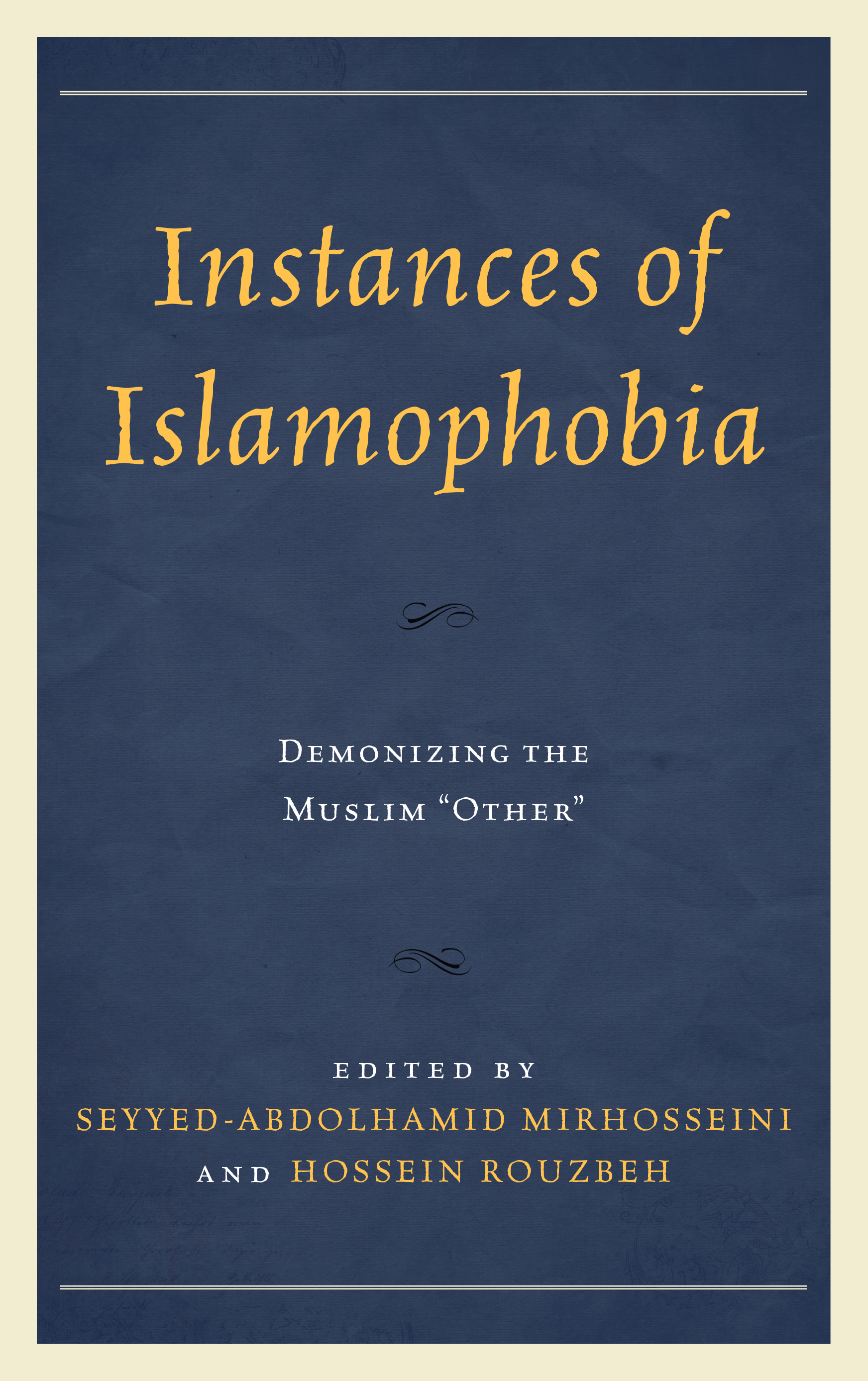Instances of Islamophobia
Instances of Islamophobia
Demonizing the Muslim Other
Edited by
Seyyed-Abdolhamid Mirhosseini
and Hossein Rouzbeh
LEXINGTON BOOKS
Lanham Boulder New York London
Published by Lexington Books
An imprint of The Rowman & Littlefield Publishing Group, Inc.
4501 Forbes Boulevard, Suite 200, Lanham, Maryland 20706
www.rowman.com
Unit A, Whitacre Mews, 26-34 Stannary Street, London SE11 4AB
Copyright 2015 by Lexington Books
All rights reserved. No part of this book may be reproduced in any form or by any electronic or mechanical means, including information storage and retrieval systems, without written permission from the publisher, except by a reviewer who may quote passages in a review.
British Library Cataloguing in Publication Information Available
Library of Congress Cataloging-in-Publication Data
Instances of Islamophobia : demonizing the Muslim "other" / edited by Seyyed-Abdolhamid Mirhosseini and Hossein Rouzbeh.
pages cm
Includes bibliographical references and index.
ISBN 978-1-4985-1758-4 (cloth : alk. paper) -- ISBN 978-1-4985-1759-1 (electronic)
1. Islamophobia. 2. Islam--21st century. I. Mirhosseini, Seyyed-Abdolhamid. II. Rouzbeh, Hossein.
BP52.I57 2015
305.6'97--dc23
2015027862
 TM The paper used in this publication meets the minimum requirements of American National Standard for Information Sciences Permanence of Paper for Printed Library Materials, ANSI/NISO Z39.48-1992.
TM The paper used in this publication meets the minimum requirements of American National Standard for Information Sciences Permanence of Paper for Printed Library Materials, ANSI/NISO Z39.48-1992.
Printed in the United States of America
Chapter 1
Introduction
Seyyed-Abdolhamid Mirhosseini
and Hossein Rouzbeh
Islamophobia as a Global Concern
beyond Muslim Communities
Islam has the divine message of ultimately meaningful human life with beauty and justice for the world. According to the Holy Quran, the prophet of Islam has been sent only as benevolence to the creatures of the world (21: 107) and all believers are called to enter peace: O believers, enter the peace, all of you (2: 208). Muslims are advised by the Quran to practice patience and kindness: Those who council each other to patience and council each other to kindness; those are the companions of the right. (90: 1718) The Holy Quran even asks Muslims to be careful about their words when facing non-believers and not to confront them with unpleasant words let alone cruel deeds: Do not revile those who pray apart from Allah. (6: 108)
In encountering non-believers, in inviting them to worship Allah, and in preaching the faith, the teaching of the Quran for Muslims is: Call them to the path of your Lord with wisdom and words of good advice, and reason with them in the best way possible. (16: 125) When coming to people who are believers of other faiths, instead of shouting the differences, Muslims are to raise the agreements, similarities, and commonalities conducive to a climate of peaceful coexistence: Tell them, O people of the Book, let us come to an agreement on that which is common between us. (3: 64) Despite the worldwide projected killer-image of Islam, according to the direct teaching of the Quran, in the Islamic worldview killing a single innocent person is a horror as huge as killing the entire human being: Whosoever kills a human being, except for murder or for spreading corruption in the land, it shall be like killing all humanity; and whosoever saves a life, saves the entire human race. (5: 32)
However, Islamic beliefs, along with enflaming hope for human communities, shape a threat to forces that aim to subdue the human sphere and to oppress people. In living with people of other faiths, the teaching of the Holy Quran for Muslims is to face them in a fair way but the clear exception is about oppressors, regardless of their faith: Do not argue with the people of the Book unless in a fair way, apart from those who oppress (29: 46). Along with the call for entrance of all believers into peace, it is stated that there is no hostility but to avoid a passive pacifist peace, a sharp exception is specified; except against those who oppress (2: 193). Not only permission is granted to the oppressed to fight oppressors (22: 39) but Muslims are forbidden from approaching them in a friendly manner:
Allah does not forbid you from being kind and acting justly towards those who did not fight over faith with you, nor expelled you from your homes. Allah indeed loves those who are just. He only forbids you from making friends with those who fought over faith with you and banished you from your homes, and aided in your exile. Whoever makes friends with them is a transgressor. (60: 89)
Who is afraid of this Islam? As the religion of peace, Islam is also the religion of justice; and justice is what those on the camp of oppression fear, be it oppression to a person or a tribe, or be it oppression at the global scale. Therefore, the hegemony of the global regimes of dominance does seem justified to be vitally afraid of Islam whose obvious teaching is not only to allow for standing against oppressors but to set it as a duty: What has come upon you that you fight not in the cause of Allah and for the oppressed men, women, and children (4: 75). Therefore, the unitary cause of peace-justice equally strongly calls for peace and justice. In calling for fair argument, the exception is those who oppress (29: 46), and in inviting to fighting for justice, aggression is forbidden: Fight those, in the way of Allah who fight you, but do not be aggressive; Allah does not like aggressors. (2: 190); If they incline to peace, make peace with them (8: 61).
Probably this very fundamental approach of Islam is the reason why those who take pains to highlight the threat of extremist Islam, rarely bother to deal with what Islam is (with no prefix or suffix) (e.g., Act for America, 2015; Lwis, 2004; Sookhdeo and Gorka, 2012). This very trick provides the room for equating Islam with the extremist Islam and shapes the basis of Islamophobia which is realized in numerous ways almost all over the world with on-going rhetoric about Islamic terrorism, radicalism and extremism, both locally and globally (Wijsen, 2013, p. 76). The rather widely-discussed Islamophobic trends reflect their widespread occurrence as almost a fact of life, especially in the West (Bevelander and Otterbeck, 2012; Gottschalk and Greenberg, 2007; Kabir, 2008; Kumar, 2010; Morey and Yaqin, 2011; Morgan and Poynting, 2012; Pedziwiatr, 2010; Powell, 2011; Puniyani, 2010; Sheehi, 2011; Tyrer, 2013; Valenta, 2010; van Liere, 2014).
On the other hand, true Islamic belief also has to face the cutting blade of radical Islam. The all-out confrontation of the essentially hegemonic and dominance-seeking Western powers is but one major global force against Islam. A view of Islam as the religion of peace as well as resistance against oppression and tyranny, that is a religion of peace-justice rather than mere pacifism, also has to face a second challenge operating under an Islamic disguise. The so-called radical Islamic groups, forces, and fighters are notoriously too widely reported on and discussed to require any introduction or further description here. Media almost all over the world are replete with the loud and unpleasant messages of these groups which tend to be received as a most visible and viable face of Islam. Therefore, rather than further introducing them, we raise three sets of questions and concerns in this regard.
Next page
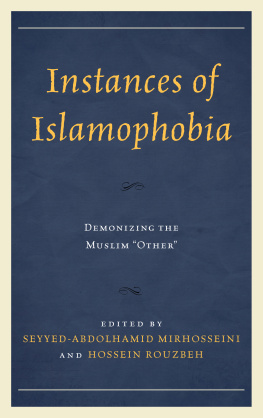

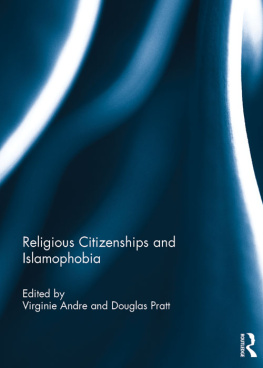
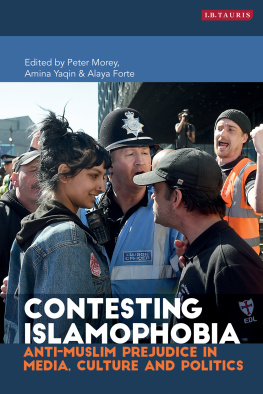
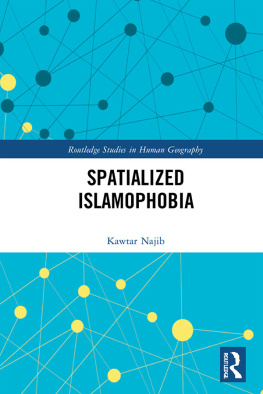

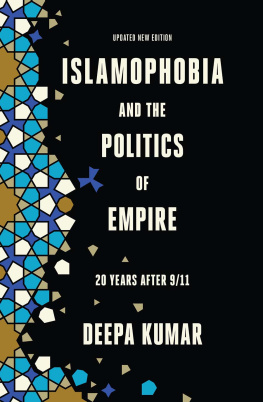





 TM The paper used in this publication meets the minimum requirements of American National Standard for Information Sciences Permanence of Paper for Printed Library Materials, ANSI/NISO Z39.48-1992.
TM The paper used in this publication meets the minimum requirements of American National Standard for Information Sciences Permanence of Paper for Printed Library Materials, ANSI/NISO Z39.48-1992.